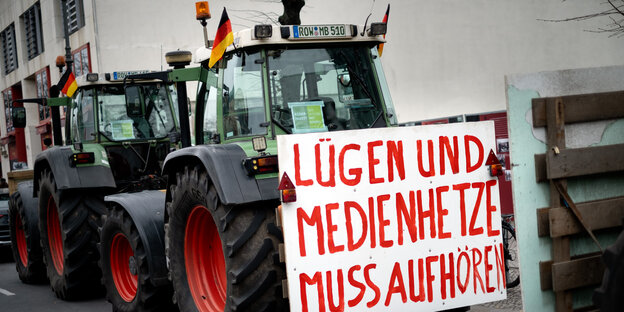Attacks on journalists in Germany have decreased. Why this is not a reason to breathe a sigh of relief and what measures are necessary.

Farmers protest in Berlin and agitate against the media. Photo: Christian Mang
The number of attacks on journalists was reduced to 41 in 2023. This is clear from a report by Reporters Without Borders (RSF). In 2022 there were still 103 attacks. It is a relief that attacks such as kicks, punches and shouts of “lying press” are decreasing. But the climate remains harsh, writes RSF.
The most dangerous state for media professionals remains Saxony with 12 attacks. It is more dangerous for journalists at political events and demonstrations on the far-right spectrum.
In recent years, manifestations of lateral thinking have been responsible for the high number of attacks. In 2023, a new phenomenon contributed to the “enemy image of the press” spreading to society in general: blockades of farmers with tractors and piles of manure.
“In recent years, an increasingly anti-press sentiment has spread in Germany,” RSF concludes. In light of these developments and the upcoming state and European parliamentary elections, there are some things that politicians, media companies and civil society must do to protect journalists:
1. Protect journalists in the field
Police officers present on the scene should be contact persons for journalists and provide quick help in dangerous situations. Police authorities must be sufficiently informed about the rights of the press. The German Association of Journalists (DJV) recommends press and information centers at demonstrations and the introduction of a nationwide press card.
2. Look where the fire is
The European Center for Press and Media Freedom (ECPMF), which publishes the “Enemy Journalist” study, is concerned about the state elections in Saxony, Saxony-Anhalt and Thuringia. Media companies should therefore send more reporters to these federal states in particular, so that real complaints do not serve as fuel for hatred against journalists.
3. Freedom of the press on the political agenda
Media professionals across Europe are increasingly facing threats to their security. Sufficient legislation must be created to support journalists in their fundamental right to report freely. The Council of Europe recommends that EU member states create a database that makes it easier for journalists to report attacks. A major EU directive to protect journalists from bullying complaints (SLAPP) was launched this year. The directive must be adapted to German law.
4. Responsibility of media companies
Employers must provide contact persons in case of attacks, as well as psychological and legal support. This should also apply to self-employed workers who are not protected by collective agreements. In 2022, the Verdi union and others created a protection code. With this, editors agree to meet certain standards. This is a good step and more media outlets should join the initiative.
5. Security training for journalists
Ahead of the upcoming state elections, Verdi is offering security training to help journalists report safely from rallies.
6. Talk about violence, even outside the newspaper.
It is necessary to discuss the fact that tractor blockades and “lying press” calls from the ranks of farmers are problematic. At the table, in school classes and having coffee with friends. Only then can the growing threat to press freedom across Europe be recognized as a problem for society as a whole and, hopefully, the number of attacks can soon be reduced to zero.